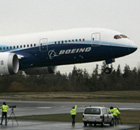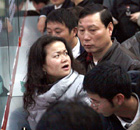Global General
UN climate talks like "childrens' homework"
(Agencies)
Updated: 2009-12-16 02:23
 |
Large Medium Small |
COPENHAGEN: Getting the world to agree a new U.N. climate deal is as difficult as forcing schoolchildren to do their homework or to make horses drink, hosts of deadlocked U.N. talks said on Tuesday.
The underlying problem in reaching a unanimous agreement among 192 nations was the diverging interests of nations ranging from Pacific island states that fear rising sea levels to OPEC oil producers worried by a loss of export earnings.
"It's just like schoolchildren," said Connie Hedegaard, the Danish minister presiding at the December 7-18 meeting, meant to agree a new U.N. pact to combat global warming after two years of negotiations among 192 nations.
"If they have a very long deadline to deliver an exercise they will wait for the last moment... It's basically as simple as that," she said, predicting a deal at the end on Friday to avert heatwaves, rising sea levels, mudslides or sandstorms.
"There's a saying in English that 'you can lead a horse to water but you can't make it drink'," said Yvo de Boer, head of the U.N. Climate Change Secretariat.
He said that Hedegaard "has been leading 192 horses to water" since negotiations began in Bali, Indonesia in December 2007. More than 110 world leaders will try to agree a deal in Copenhagen on Friday at a concluding summit.
The talks have to agree by unanimity -- meaning each nation has an effective veto.
So far the talks have little to show with deep splits about the depth of cuts in emissions by developed nations, the amount of cash needed to help developing nations and what actions the poor should take to combat warming.
"Why is it so complicated? -- I've put the same question to myself since I, five years back, attended my first COP (U.N. Conference of the Parties)," she said.
At that meeting in Buenos Aires: "The words were the right ones, the concerns were the right ones. It seemed that the will was there but the steps that the world was able to take were much too small," she said.






